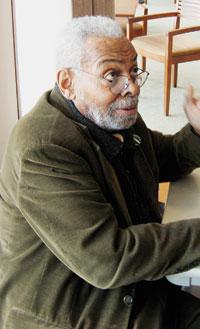Imamu Amiri Baraka is no stranger to controversy. In fact, he just dives right in. Onm Wednesday April 11 he came to campus to read from his latest book, “Tale of the Out and the Gone,” a collection of short stories. He opened his reading by speaking about radio DJ Don Imus’ recent, and now infamous, derogatory remarks regarding the Rutgers University women’s basketball team.
“I have five daughters, and not one of them is a nappy-headed ho,” Baraka said. “And any motherfucker who calls them that is gonna get smacked. I forgive Imus. I want him fired. But I forgive him.”
Baraka is the former Poet Laureate of New Jersey, leaving after controversy over his poem “Somebody Blew Up America” caused the Anti-Defamation League to call for his resignation in 2003. Baraka refused, saying that his work was being misrepresented and mischaracterized, and he was, in fact, the one being defamed.
“I was addressing the fact Israel was able to warn its nationals to stay away on 9/11, so somebody knew something. How come we didn’t get a warning? That’s what I was asking.” This led New Jersey to eliminate its Poet Laureate position altogether. Indeed, controversy has dogged the outspoken poet throughout his notable career.
Baraka is the founder of the Black Arts Movement, an artistic offshoot of the Black Power movement of the ’60s and ’70s. His work has always been inherently political; Baraka has always advocated fighting oppression in the system. He’s avoided some of his earlier stances that were seen by many as reverse-racist, anti-Semitic and sexist, and although he used to be more violent in his rhetoric, he’s channeled that rage into organizing for social change.
“There are people all over the world suffering as bad as black people in America,” Baraka said. “Some of the poor white people look at us and think we got it good. But as [W.E.B.] Dubois said, only we were real estate. But it’s reverse racism to be isolationist; you’re in some kind of closed ghetto to say that nobody else but you is suffering.”
Baraka is fiercely proud of African-American culture. He notes that Duke Ellington, the legendary jazz musician, registered more than 2,000 pieces of music before going on to say that “the treasure chest of the Afro-American is so deep that we don’t have to guard it with ignorance and fear … we can share it.”
Even more than racial issues, Baraka’s writing deals with issues of class in America. As he reads from “Dig This! Out?,” Baraka remarked that there is no other way to make one people inferior to another except to make them live worse than other folks. He talked about national oppression on a societal-wide level, group condemnation and robbery of the common people by the government.
“The National Debt is owed to us,” he said. “It’s owed to black people, Native Americans and to the poor white folks living worse than black folks. All the taxes for the wars we didn’t want, that’s money taken from our communities.” Baraka added that, “the lies they tell about the distribution of wealth are staggering.” He went on to say “all wars could be stopped” if we redistributed wealth from hands of the concentrated few to the many.
Asked a question about the aftermath of Hurricane Katrina, Baraka said, “I went there and I saw the Garden District … way up high where the wealthy folks live and the colored folks lived next to the levee, the levee they swore they couldn’t fix. Then the levee breaks and they’re gone. They’ve moved 200,000 people out and they’re not coming back. They just made one of the only blue states in the South a red state. You see it’s always about money and power.”
Asked about the genocide in Darfur, Baraka asserted that it is a product of colonialism and post-colonialism. “They’ve left behind their contradictions and their civil wars. While you’re busy fighting each other, they’re busy oppressing you … the wealth of the West is built upon the exploitation of colored people.”
Regarding the War on Terror, Baraka again dove right in and opens a huge can of worms. Having been himself likened to a domestic terrorist by government and law enforcement groups as a part of the militant arm of the Black Power movement, he unapologetically said, “the closest one I’ve seen to Osama bin Laden is George W. Bush. You know, when he named his ‘Axis of Evil,’ they’re all colored people.” Such rhetoric is familiar territory from the far left and it drew applause from the crowd.
Baraka’s modern message remains one of agitation for change through informed empowerment. He admonished the students in the room to read at least one newspaper every day. “You have to think internationally and act locally. You have to coordinate with progressives all over the world.”
Organizing, he said, is the only rational response to the oppression in national societies. “You got to stand up and fight.”





















































